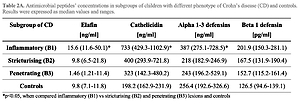Current issue
Archive
Manuscripts accepted
About the Journal
Editorial office
Editorial board
Section Editors
Abstracting and indexing
Subscription
Contact
Ethical standards and procedures
Most read articles
Instructions for authors
Article Processing Charge (APC)
Regulations of paying article processing charge (APC)
GASTROENTEROLOGY / RESEARCH LETTER
Plasma elafin, cathelicidin, and α-defensins are
increased in paediatric inflammatory Crohn’s disease
and reflect disease location
1
Department of Paediatrics, Gastroenterology, and Nutrition, Jagiellonian University
Medical College, Krakow, Poland
2
Department of Clinical Biochemistry, Jagiellonian University Medical College, Krakow,
Poland
Submission date: 2021-04-10
Final revision date: 2021-05-31
Acceptance date: 2021-06-01
Publication date: 2021-06-11
Corresponding author
Andrzej Wędrychowicz
Jagiellonian University Medical College, Department of Pediatrics, Gastroenterology and Nutrition, Wielicka Str. 265, 30-663, Krakow, Poland
Jagiellonian University Medical College, Department of Pediatrics, Gastroenterology and Nutrition, Wielicka Str. 265, 30-663, Krakow, Poland
Arch Med Sci 2021;17(4):1114-1117
KEYWORDS
TOPICS
ABSTRACT
Introduction:
The aim of our study was to assess antimicrobial peptides in children with Crohn’s disease (CD).
Material and methods:
Plasma elafin, cathelicidin, alpha and beta-defensins were assessed in 35 children with CD using immunoassays. Phenotype and location of CD were assessed based on the results of endoscopic and radiology studies.
Results:
We found increased elafin, cathelicidin and alpha-defensins in children with inflammatory phenotype as compared to stricturising and penetrating phenotypes of CD. Additionally, we found increased elafin and cathelicidin in colonic location and alpha defensins in ileal CD locations.
Conclusions:
Assessing antimicrobial peptides may be helpful in estimating of phenotype and location of CD lesions.
The aim of our study was to assess antimicrobial peptides in children with Crohn’s disease (CD).
Material and methods:
Plasma elafin, cathelicidin, alpha and beta-defensins were assessed in 35 children with CD using immunoassays. Phenotype and location of CD were assessed based on the results of endoscopic and radiology studies.
Results:
We found increased elafin, cathelicidin and alpha-defensins in children with inflammatory phenotype as compared to stricturising and penetrating phenotypes of CD. Additionally, we found increased elafin and cathelicidin in colonic location and alpha defensins in ileal CD locations.
Conclusions:
Assessing antimicrobial peptides may be helpful in estimating of phenotype and location of CD lesions.
Share
RELATED ARTICLE
We process personal data collected when visiting the website. The function of obtaining information about users and their behavior is carried out by voluntarily entered information in forms and saving cookies in end devices. Data, including cookies, are used to provide services, improve the user experience and to analyze the traffic in accordance with the Privacy policy. Data are also collected and processed by Google Analytics tool (more).
You can change cookies settings in your browser. Restricted use of cookies in the browser configuration may affect some functionalities of the website.
You can change cookies settings in your browser. Restricted use of cookies in the browser configuration may affect some functionalities of the website.



